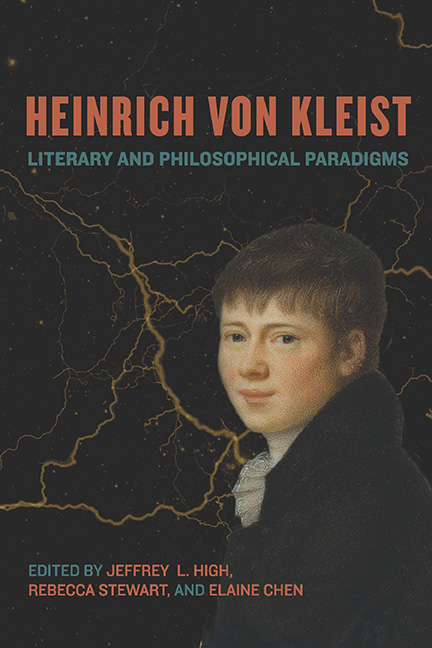Foreword: A Note on Kleist in American Art, Film, and Literature
Published online by Cambridge University Press: 26 May 2022
Summary
JEFFREY HIGH, REBECCA STEWART, AND ELAINE CHEN—all three USAmerican Germanists—make clear in the introduction to this excellent volume that it deals with the literary and philosophical sources of Kleist’s works. Over the last year, they have sent me the individual contributions. It became clear to me again that Kleist knew little about the United States, and that he (unlike Goethe and Schiller) was neither particularly interested in its political founders nor its people. The two Weimar authors were a generation older, had been able to follow the course of the successful Revolutionary War in gazettes and journals, and had only positive things to say about it. Kleist was born in 1777, during the founding struggle of the American Republic, a then still-loose confederation of previously English colonies. As Kleist grew up, Europe was under the spell of the French Revolution. Soon after, Napoleon Bonaparte became the dominant figure on the European continent: the exporter of the revolution as well as its domesticator, a genius general and a new Caesar. For Kleist, Napoleon became the negative fascination par excellence.
The millions of emigrants who left Germany between 1830 and 1910 to try their luck in the United States often placed an emphasis on the continued cultural connection to their country of origin. Thus, cultural societies, monuments, and streets were named after Goethe and Schiller. It was self-evident that their works were dealt with in the literature departments of American colleges and universities. Even in Germanistik (German studies) research, as it was carried out in the United States during the late nineteenth century, there was no need to complain about too few studies on the classical authors. The spread of Schiller's fame (especially in the middle of the century) and of Goethe's growing popular reputation (especially after the founding of the Reich) was a result of the high esteem of German culture in America. Statistics show that by 1910 about a quarter of all high school students learned German.
Kleist was left out. He was rarely mentioned, and the systematic exploration of his work did not start until the twentieth century.
- Type
- Chapter
- Information
- Heinrich von KleistLiterary and Philosophical Paradigms, pp. vii - xiiPublisher: Boydell & BrewerPrint publication year: 2022



